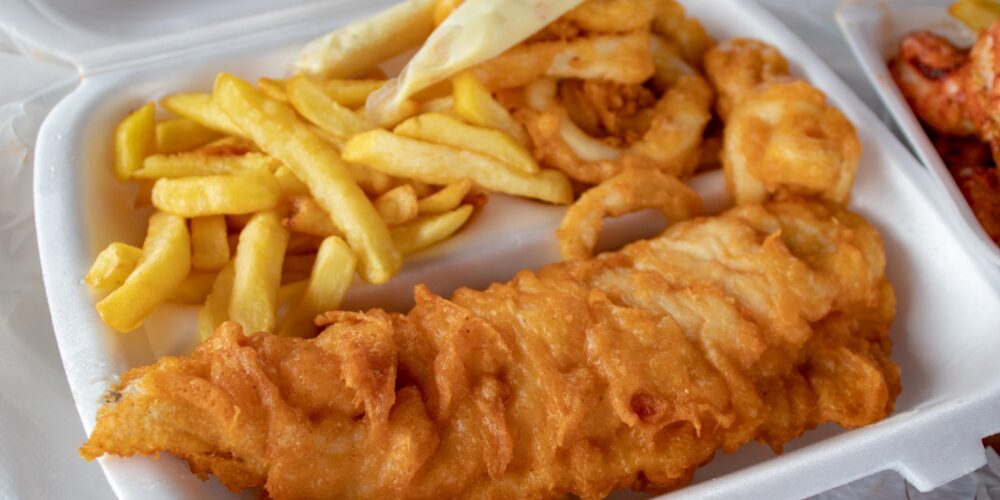Humans are at their best when they embrace their diversity

Fish & chips. Is there a dish more quintessentially British? It seems to shout out its patriotism.
When I first rocked up in the British isles for my studies, a naïve lad from Kenya, I made sure I sought out a fish and chips eatery. I found there was one around every corner, and that they were called “chippies.” I tried a portion of the country’s signature dish quickly—eaten in a paper cone, as in the comic books of my youth—but came away disappointed, thinking that my own experiences of the offering back in Nairobi were, weirdly enough, superior.
But the bigger revelation came decades later. Fish & chips is not even British!
The fried fish part probably came from Jewish immigrants from Portugal; the first versions sold in London were called “fish fried in the Jewish fashion.” It started slowly, but the advent of large-scale trawler fishing made North Sea cod inexpensive, and fried fish became increasingly popular. The chips—pommes frites—originated in France or Belgium. It was as recently as the second half of the 19th century that fried fish was combined with fried potatoes, and the modern classic was born.
Fish and chips is the dish so many Britons eat with nationalistic fervour, thinking it is genuinely “ours.” Erm, no.
Let’s go further afield. If I ask you to name your favourite Italian dish, it will probably have tomatoes in it. Spaghetti Bolognese, Penne Arrabiata, Pizza Margherita, Caprese Salad? All have tomatoes as an essential ingredient. So tomatoes must be Italian, right? Nope. They originated in South America, and were brought to Europe by Spanish explorers.
Let’s cross the ocean to India. Hot and spicy food is the hallmark, is it not? Only recently. The chilli pepper did not exist in India before the Portuguese brought it over in shiploads.
Similarly: hamburgers are not American (Hamburg, duh); Danish pastries do not originate in Denmark; croissants were first thought up not in France, but Austria.
Let’s end this voyage by coming back home to Kenya. Our trademark staple is ugali, right? Must be ours? No again. There was no maize in these parts until those same Portuguese traders brought it over in their ships. Because maize was easier to cultivate at scale than sorghum and millet, it soon displaced those earlier grains as a porridge base. And a child growing up in Kenya today would well imagine that samosas, bhajias, pilau and chapati are authentically Kenya dishes. Actually they washed up on these shores in the hands and minds of successive waves of Indian and Middle Eastern traders and immigrants.
I wrote on this page a while back: there is no such thing as cultural purity. We are pretty much all mongrels and the offspring of immigrants. We are all mixed up—and we are richer as a result. Ideas and ingredients fly in from all directions. What is important is what we do with what we import. Fifty years after Britain first encountered fish and chips, there were as many as 35,000 fish and chips eateries across the land. They perfected the fast-food dish, and made it their own. Italy now has some of the world’s elite tomato varieties, such as Pomodoro San Marzano, after centuries of experimentation and selection. India uses hot spices to sublime effect.
It’s not what comes into the melting pot that matters, but what happens next.
Our cultures are never as unique or exceptional as we believe. We all owe a debt to other cultures, other peoples, other traditions. Our foods, our clothes, our languages—they are a mishmash of multiple sources and influences. Narrow-minded nationalism and xenophobia are based on ignorance. We are often protecting the products originally of others, not our own.
By being open to manifold influences, we give ourselves a unique strength. Kenya’s economy is these days of much interest to the outside world. Why? Fundamentally because of its diversity. We have vastly varied activities happening in this country, across a plethora of sectors. We are an agricultural economy—but we are many more things as well. We are very attractive to tourists—but we carry on regardless if they stay away. We briefly thought we had discovered marketable oil recently—but we shrugged and moved on when it turned out we hadn’t really. We are famous for our tea and coffee and horticulture—but also for our mobile money. We grow world-beating runners here—but also a vast array of business startups.
This is because of an unspoken truth: that having a kaleidoscope of influences is good. Kenya is not the hegemony of one ethnic group; it is not the product of one culture; it has many, many irons in the fire. This gives us not just variety, but resilience. It is behind our famed “bounceability” as a society.
The story of fish and chips and tomatoes and chillis is actually a story about false boundaries. Lines on maps are artificial borders drawn by misguided bureaucrats. Passports and visas are human constructs. The people of earth were born to mix and mingle, to view one another’s accomplishments with respect and curiosity. We are at our best as a species when we are a confluence of cultures, a fusion of flavours.
(Sunday Nation, 9 September 2024)

Buy Sunny Bindra's new book
The X in CX
here »
Popular Posts
- My books of the yearDecember 14, 2025
- Here’s why you should become foolishNovember 30, 2025
- Confessions of an explaining personDecember 7, 2025
- Is AI hiring your company into oblivion?November 23, 2025
- How to listen, really listenNovember 16, 2025















